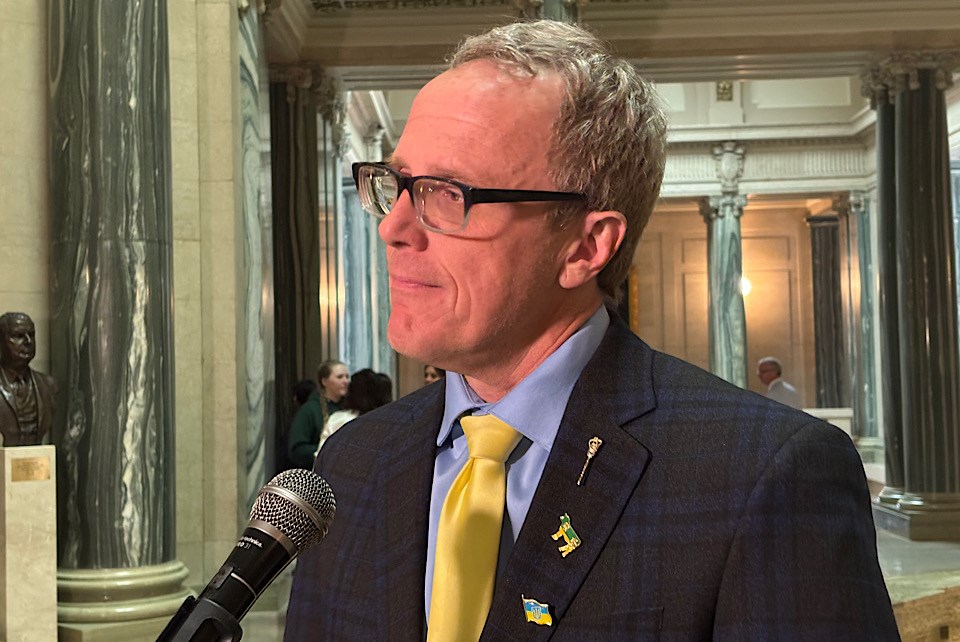REGINA - The government was on the receiving end of questions Thursday about a funding reduction to the Ukrainian Canadian Congress of Saskatchewan.
According to the organization’s news release dated May 1, the province has ended funding for displaced Ukrainian settlement services being provided by the UCC, with the reduction confirmed in the provincial budget. UCC confirms that as of April 30 five full-time and one part-time UCC settlement staff members in Regina and Saskatoon have been laid off.
“Although the number of arrivals to Saskatchewan has declined over the past year, this decision was a surprise,” said Elena Krueger, President of UCC Saskatchewan, in a statement. “UCC Saskatchewan has been delivering necessary settlement services to individuals and families who have sought refuge in our province since the russian full-scale invasion in February 2022. In recent months, staff have seen the arrival of new family members and friends of the first refuge seekers coming to our offices in Regina and Saskatoon. Since Feb. 2022, over 8,000 displaced Ukrainians have arrived in Saskatchewan. UCC Saskatchewan is grateful to the Government of Saskatchewan for its support for displaced Ukrainians over the past three years.
“It is, however, disappointing that, at a time when Russia continues to bomb Ukraine on a daily basis and Ukrainian men, women and children are being killed, the funding for needed settlement supports for those who have fled the war is being cut. These funding cuts create additional barriers for those newcomers seeking to gain their permanent residency status, the important next step to becoming full citizens of Canada.”
NDP MLA for Saskatoon Churchill-Wildwood Keith Jorgenson blasted the funding reduction.
“It is callous and cold of the government to cut the funding to this group of people in the middle of an active war,” he said.
Jorgenson told reporters at the Legislature that the government “doesn’t seem aware of their own cuts they are making. The minister got up and didn’t seem aware that these cuts had occurred.”
Jorgenson said the cuts impact settlement work, including “helping people not just with employment, helping people learn English, translation of documents, ID, passports — there is an array of unique issues facing this group of immigrants that are different from other immigrants.”
Minister of Immigration and Career Training Jim Reiter said Jorgenson’s question to him in Question Period on funding “cuts” was “completely misleading.”
“There was no reduction in services. There was additional funding put in a couple of years ago when there was a large influx of Ukrainian refugees when the war had first started. Saskatchewan as you know welcomed thousands of refugees. There was extra funding put in place for placement services and supports. What’s happened since then is the federal government in March of last year, so over a year ago now, stop issuing those special visas. So that influx is effectively down to a trickle if at all. So what this is is a reduction in funding recognizing that fewer people are using the services, but the services are all still in place. Plus, Ukrainian refugees are also welcome to use all the settlement services that other groups use as well.”
As for the dollar amount, Reiter confirmed the reduction is $500,000, out of the additional $700,000 in funding that had been provided for initial settlement supports. The province says it is still providing $200,000 of that amount, to address the fact there were still a few coming in.
“I want to emphasize, though, no services are eliminated. The services are all still there — English as a second language, employment work, all those sorts of programs are all still in place,” Reiter said.
In response to Reiter’s comments, Jorgenson said this:
“My understanding is the minister is referring to this as not a cut but a reduction in funding. The end result is the same. Although the flow of immigrants from Ukraine has slowed in recent months, these people still require critical supports to integrate, settle, find employment. These cuts are cruel and not only bad from a humanitarian point of view, it’s also bad for our economy. It fails to supply critical supports to people to learn English, find a place to live, find a job, and so on.”




